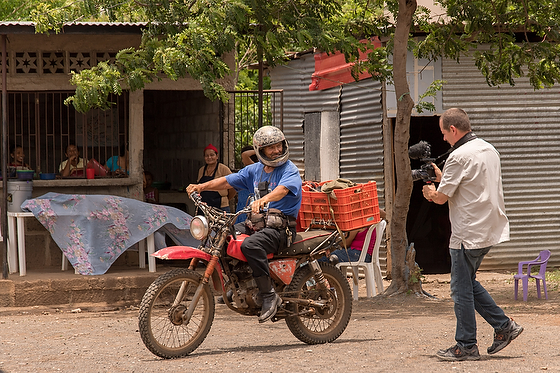 |
| Nikon D5, Sigma 24-105mm f/4 DG OS HSM Art Lens, ISO 640, ƒ/9, 1/100 |
 |
| Nikon D5, Sigma 24-105mm f/4 DG OS HSM Art Lens, ISO 1250, ƒ/4, 1/100 |
Each day we had a different missionary lead us.
 |
| Nikon D5, Sigma 24-105mm f/4 DG OS HSM Art Lens, ISO 4000, ƒ/8, 1/100 |
We take some time the first few days where we spend time in the classroom helping you with that days assignment. Now this is a photo from the classroom we were using in Managua, Nicaragua.
 |
| Nikon D5, Sigma 24-105mm f/4 DG OS HSM Art Lens, ISO 20000, ƒ/8, 1/100 |
 |
| Nikon D5, Sigma 24-105mm f/4 DG OS HSM Art Lens, ISO 100, ƒ/4, 1/640 |
 |
| Nikon D5, Sigma 24-105mm f/4 DG OS HSM Art Lens, ISO 2000, ƒ/4, 1/100 |
We are asking you to identify each of the elements of the storyline in your story. Your outline will look something like this:
- Subject/Character – A little information about the person you are covering
- Their family
- Their work
- Their volunteer work
- Conflict/Problem – What is the problem that they cannot solve on their own
- Guide/Resource – who is helping them and what resources are available or lacking?
- Assignment – What does the guide/mentor recommend to help solve the problem for the subject?
- Actions – What actions has the subject taken
- Outcome – Is it a Tragedy or Comedy?
- CALL TO ACTION – We add one more step in the story process of basically asking a very direct question to the audience and direction on how to get involved. We are not teaching you to just entertain with a story, but rather to engage the audience until they are taking action and getting involved in some way.
 |
| Nikon D5, Sigma 24-105mm f/4 DG OS HSM Art Lens, ISO 1600, ƒ/4, 1/100 |
Many of our students have been shooting for many years and been doing videos or photos to help missions or NGOs tell their stories. We spend a lot of time helping them break some of those bad habits and giving them the tools to help them do a better job as a storyteller.
Stages of Learning
There are stages of learning. Here are the six basic stages, listed from the most rudimentary to the highest levels of comprehension:
- Knowledge (memorizing, recalling)
- Comprehension (expressing ideas in new forms)
- Application (transfer of learning to a new situation)
- Analysis (breaking a communication down into its parts)
- Synthesis (creating something new by putting parts together)
- Evaluation (judging value based on standards)
 | |
|
We are training you to identify a story and how to produce this story so that it connects with the audience and elicits a response, which we call the CALL TO ACTION.
 |
| Nikon D5, Sigma 24-105mm f/4 DG OS HSM Art Lens, ISO 1100, ƒ/4, 1/100 |
Here I am giving some examples to the class. We then explain how we use a visual to communicate and direct the audience to understanding.
Each thing you learn you will see an example, then you will also learn why we do it a certain way and then you get to practice those skills yourself. The good thing is each day you are evaluated on how well you performed. If you fell short we send you back for it to be done again.
 |
| Nikon D5, Sigma 24-105mm f/4 DG OS HSM Art Lens, ISO 2200, ƒ/4, 1/100 |
The past couple of trips we had some storytellers along capturing the story of the workshop. Rob Llewellyn who works also with ESPN came along and also jumped in to help one of the students while we were busy with the other students.
 |
| Nikon D5, Sigma 24-105mm f/4 DG OS HSM Art Lens, ISO 14400, ƒ/11, 1/100 |
The last thing we are doing while in country before taking off for the airport is a screening of all the videos with the subjects and all those who helped us in the process. This helps us realize there is a real deadline to get this project done.
 |
| Photo by Rob Llewellyn |
Here is photo of Jeff Raymond, Team Leader; James Dockery, teacher; and Stanley Leary, teacher in downtown Managua, Nicaragua.
Please consider joining Stanley Leary and Gary S. Chapman in Honduras for a similar workshop on October 29 – November 5, 2016. Honduras Workshop information.
We haven't chosen location or dates for 2017 Storytellers Abroad workshops, but be sure and bookmark this in your browser and check back every so often to see about our future workshops.
This is a video we made while in Lisbon, Portugal to explain the workshop.
This is a video we made while in Lisbon, Portugal to explain the workshop.



No comments:
Post a Comment